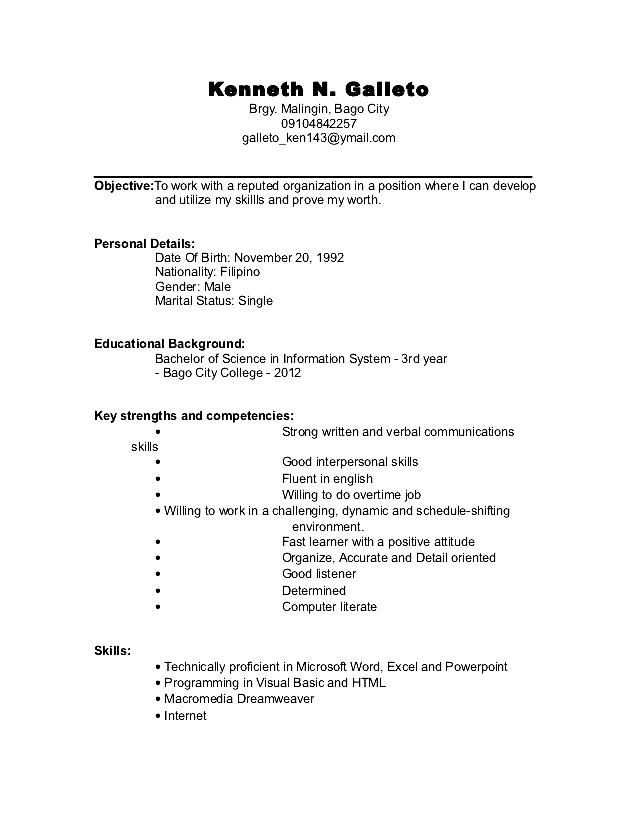Undergraduate Curriculum Vitae

Crafting an effective undergraduate curriculum vitae (CV) is an essential skill for students aiming to stand out and make a strong impression on potential employers, academic institutions, and scholarship committees. This comprehensive guide will delve into the intricacies of creating a powerful CV, providing insights and tips to help you showcase your unique qualifications and experiences. From highlighting relevant coursework to detailing extracurricular involvement, we'll cover all the critical elements that make an undergraduate CV shine.
Curriculum Vitae: A Powerful Tool for Undergraduates

In the competitive landscape of higher education and the job market, a well-crafted curriculum vitae can be your secret weapon. Unlike a resume, which is often concise and tailored to a specific job application, a CV is a comprehensive document that provides a detailed overview of your academic and professional journey. It allows you to showcase your accomplishments, skills, and potential in a way that resonates with your audience.
The Art of Storytelling: Your Academic Journey
Think of your CV as a narrative, a story of your academic and personal growth. It should reflect your passion for learning, your dedication to excellence, and your unique path towards achieving your goals. Here’s how you can weave a compelling narrative through your CV:
- Relevant Coursework: Highlight the courses that align with your career aspirations or academic interests. Mention any challenging or specialized subjects you've excelled in. For instance, if you're applying for a research position, emphasize courses related to research methods or specific scientific disciplines.
- Academic Projects: Discuss group projects, individual assignments, or research initiatives you've undertaken. Provide details on the project's scope, your role, and the skills you developed. If you've presented your work at conferences or published it in academic journals, be sure to include these achievements.
- Awards and Honors: Recognitions such as Dean's List mentions, scholarships, or awards for academic excellence can significantly enhance your CV. These accolades showcase your dedication and provide a glimpse into your potential for future achievements.
- Extracurricular Activities: Beyond academics, your involvement in clubs, societies, or volunteer work speaks volumes about your character and skills. Leadership roles, event organization, or community service initiatives can demonstrate your ability to work in teams, lead projects, and contribute to a cause.
Technical Skills and Proficiency
In today’s digital age, possessing a range of technical skills is highly valued. Here’s how you can showcase your technological prowess:
- Programming Languages: If you've dabbled in coding, mention the languages you're proficient in. Whether it's Python for data analysis, Java for app development, or HTML/CSS for web design, these skills are highly sought after in various industries.
- Software Proficiency: Highlight your expertise in commonly used software tools. For instance, proficiency in Microsoft Office Suite, Adobe Creative Suite, or statistical analysis software like SPSS can set you apart from other applicants.
- Data Analysis and Research Tools: If you've used specialized software for data analysis, research, or statistical modeling, be sure to include these skills. Tools like R, STATA, or GIS can be particularly valuable in certain fields.
Research and Publications
Engaging in research is a significant accomplishment for undergraduates. Here’s how you can present your research experience effectively:
- Research Projects: Describe your research initiatives, including the topic, methodology, and any significant findings. If you've presented your research at conferences or symposiums, provide details on the event and your role.
- Publications: If you've published your research in academic journals or as part of a thesis, include these achievements. Provide the title, journal name, and year of publication. This showcases your ability to conduct rigorous research and contribute to academic discourse.
- Research Assistantships: Working as a research assistant is a valuable experience. Mention the projects you've assisted with, the skills you gained, and any mentors or supervisors you worked under.
Internships and Work Experience
Internships and part-time jobs are excellent opportunities to gain real-world experience. Here’s how you can highlight these experiences:
- Internship Details: Provide the name of the organization, your role, and the duration of the internship. Describe your responsibilities and any significant contributions you made. Highlight any skills you developed or projects you worked on.
- Part-Time Jobs: Even if your part-time job is unrelated to your field of study, it can demonstrate your work ethic, time management skills, and ability to handle multiple responsibilities. Mention the key duties and any notable achievements.
Community Engagement and Volunteerism
Involvement in community initiatives and volunteer work demonstrates your commitment to social responsibility and personal growth. Here’s how to present these experiences:
- Community Projects: Discuss the causes or initiatives you've supported. Mention the impact of your efforts, whether it was organizing fundraisers, mentoring youth, or participating in environmental conservation projects.
- Volunteer Experience: Highlight the organizations you've volunteered for, your roles, and the skills you developed. For instance, if you volunteered as a tutor, you can emphasize your patience, communication skills, and ability to simplify complex concepts.
Personal Projects and Hobbies
Personal projects and hobbies can provide a unique insight into your creativity, passion, and dedication. Here’s how you can incorporate them into your CV:
- Creative Pursuits: If you're an artist, musician, writer, or have any other creative hobbies, mention your accomplishments. Showcase any exhibitions, performances, or publications you've been a part of. These activities can demonstrate your ability to think creatively and manage diverse interests.
- Personal Projects: Discuss any personal projects you've undertaken, such as building a website, creating a mobile app, or developing a business plan. These projects showcase your initiative, problem-solving skills, and ability to see ideas through to completion.
References and Recommendations
Incorporating references and recommendations from mentors, professors, or supervisors can significantly strengthen your CV. Here’s how you can approach this section:
- Professors and Mentors: Request letters of recommendation from professors who know your academic abilities or mentors who have guided your professional development. Include their contact information and a brief description of your relationship with them.
- Professional References: If you've held internships or part-time jobs, include references from supervisors who can vouch for your work ethic and skills. Ensure you have their permission and provide their contact details.
Tips for an Effective Undergraduate CV
Here are some additional tips to enhance your CV:
- Tailor Your CV: Customize your CV for each opportunity. Highlight the experiences and skills that are most relevant to the position or field you're applying to.
- Use Keywords: Research the industry or field you're targeting and incorporate relevant keywords into your CV. This can help your CV stand out to recruiters or hiring managers.
- Keep it Concise: While a CV is more detailed than a resume, it should still be concise and well-organized. Focus on quality over quantity and ensure each section is clear and easy to read.
- Use Action Verbs: Describe your experiences using powerful action verbs to capture the reader's attention. Words like "developed," "implemented," or "led" can make your CV more engaging.
- Proofread and Edit: Carefully review your CV for grammatical errors, typos, or inconsistencies. Consider asking a friend or professor to review it for a fresh perspective.
The Future of Your Academic Journey
As you embark on your academic journey, your curriculum vitae will evolve and grow with you. It will reflect your increasing expertise, accomplishments, and experiences. Remember, your CV is a powerful tool to showcase your unique journey and potential. With a well-crafted CV, you’ll be able to make a lasting impression and open doors to exciting opportunities.
What is the difference between a CV and a resume?
+A CV is a comprehensive document that provides a detailed overview of your academic and professional journey, often used in academic and research settings. A resume, on the other hand, is a concise document tailored to a specific job application, focusing on relevant skills and experiences.
How long should an undergraduate CV be?
+The length of your CV can vary depending on your experiences and the field you’re applying to. As an undergraduate, your CV may be 1-2 pages long. However, as you gain more experience and achievements, it can extend to 3-4 pages.
Should I include personal interests and hobbies on my CV?
+Including personal interests and hobbies can provide a unique insight into your character and passions. However, ensure that these interests are relevant and add value to your CV. Avoid including generic hobbies unless they directly relate to your field or demonstrate a valuable skill.



